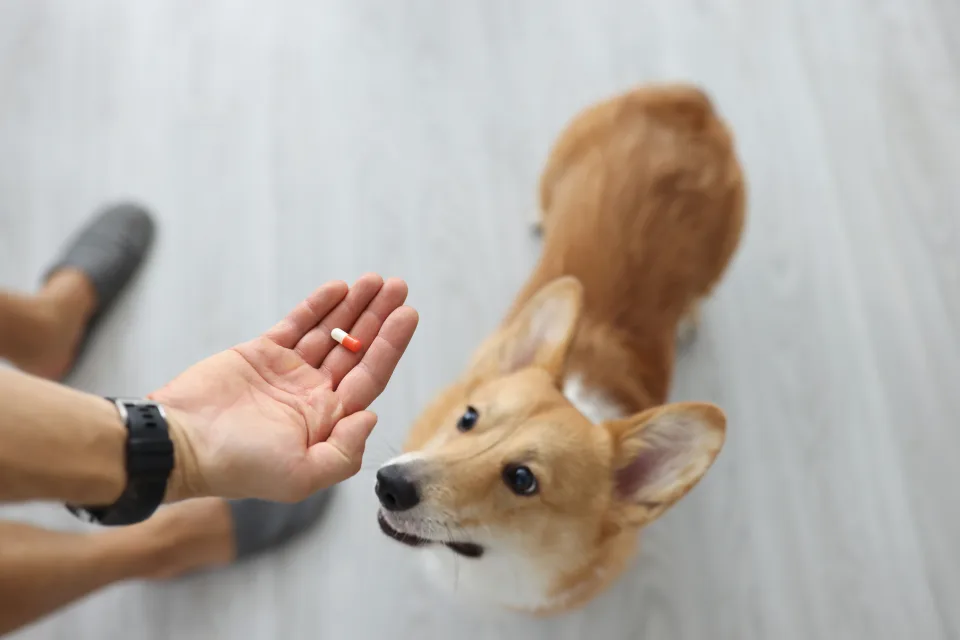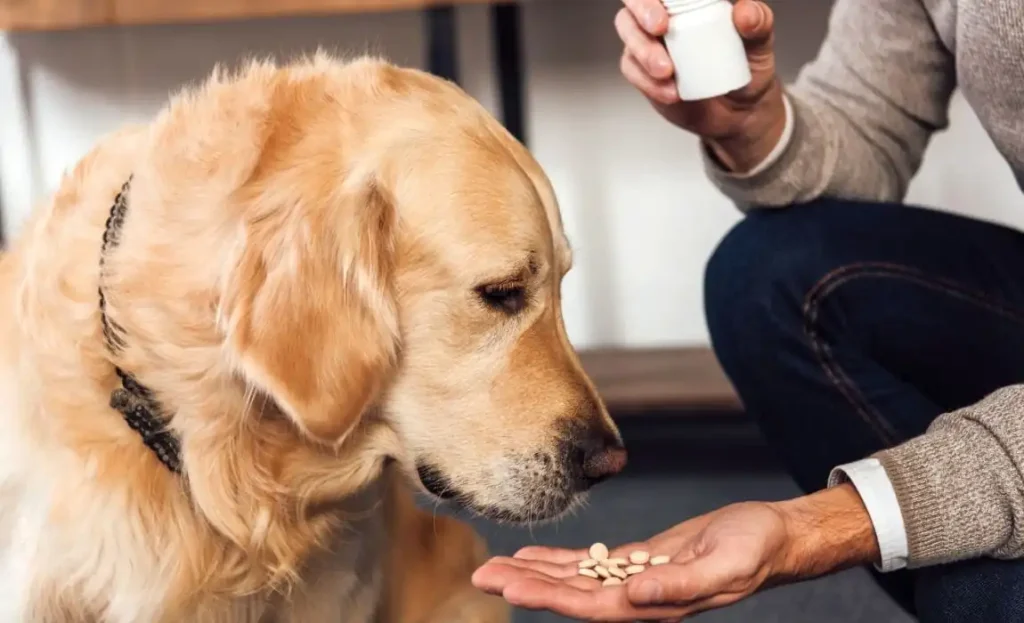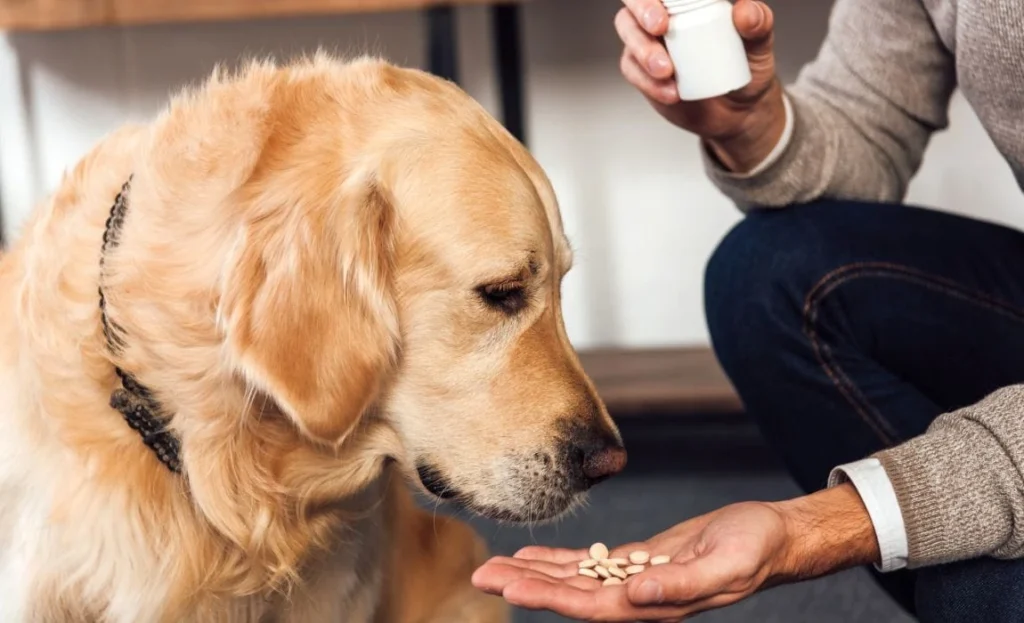Probiotics, the reason why we pay so much attention to, mainly because of its “outstanding contribution” to the dog’s intestinal health – 1) inhibit the reproduction of harmful bacteria; 2) promote the growth of beneficial bacteria.
In the dog’s gastrointestinal discomfort in the appropriate amount of time to take, can relieve vomiting, diarrhea and other symptoms; usually can also be used as a health care drug appropriate to maintain the dog’s intestinal probiotic ecology, improve the dog’s immunity.
★ What is Probiotics

Probiotics (Probiotics), as the name suggests, is beneficial to the health of bacteria, is to improve the balance of the host’s intestinal microflora and the role of the active microorganisms, mainly plant-based dietary fiber for the growth of raw materials.
There are several varieties of probiotics, but commonly found in human and animal supplements, the following 2 major groups are among the most basic:
▶ Lactobacillus
Lactobacillus is a beneficial bacterium that ferments sugar to produce lactic acid, and is found in sour milk. Lactobacillus has an inhibitory effect on pathogenic bacteria (harmful bacteria), fights infection, promotes digestion, maintains the micro-ecological balance of the intestinal tract, and strengthens the body’s immunity. In addition, Lactobacillus synthesizes amino acids and vitamins needed by the body and lowers cholesterol.
▶ Bifidobacterium
Bifidobacterium can treat antibiotic-associated diarrhea, relieve constipation, intestinal inflammation and irritable bowel syndrome symptoms; it can adsorb carcinogenic and mutagenic substances in food, activate phagocytosis activity of the body’s macrophages, and induce apoptosis of tumor cells, thus achieving the role of inhibiting carcinogens and tumor cells; Bifidobacterium in the human intestinal fermentation can produce lactic acid and acetic acid, which can improve the body’s absorption and utilization of minerals such as calcium and iron. Bifidobacteria can produce lactic acid and acetic acid after fermentation in human intestines, which can improve the absorption and utilization of mineral elements such as calcium and iron. In addition, Bifidobacterium can produce vitamin B1, B2, B6, B12, alanine, valine, aspartic acid, threonine and other essential nutrients.
Lovearound Freeze-dried Pet Food not only uses fresh ingredients, but also adds probiotics as auxiliary regulators to protect the micro-ecological balance of the pet’s stomach and intestines, promote digestion and absorption, ensure balanced nutrition, improve immunity, and to a certain extent, reduce the probability of occurrence of some diseases. As the saying goes, “pay for the food, rather than the vet”.
★ Dog intestinal flora

The flora in your dog’s intestinal tract consists of not only beneficial bacteria (probiotics), but also harmful bacteria and neutral bacteria:
▶ Harmful bacteria
Harmful bacteria are active microorganisms that negatively affect the life process of the subject. When they grow and multiply in large numbers, they secrete endotoxins, destroy the immune system, and prevent the growth and reproduction of probiotics, leading to a variety of undesirable symptoms and diseases in the subject.
▶ Neutral bacteria
Under normal circumstances, they have no effect or a small positive effect on the body, but neutral bacteria are typical “wallflowers”, and when the intestinal flora is out of balance (harmful bacteria outnumbering the beneficial bacteria), they will have the same negative effect on the body as the harmful bacteria.
When the number of beneficial bacteria exceeds the number of harmful bacteria, the three form a balanced state, and the subject’s stomach is healthy. If the number of harmful bacteria is higher than the number of beneficial bacteria, the flora imbalance will lead to gastrointestinal discomfort in the dog, resulting in soft stools and diarrhea and other adverse effects.
★ The role of Probiotics

1. Help synthesize vitamins
Vitamins needed by the dog’s body can not be completely ingested through food, and some of them are synthesized by probiotics in the intestines. For example, vitamin K, the content in the food is very small; if the beneficial flora is reduced, it will cause vitamin K deficiency, resulting in diarrhea, diarrhea and other diseases.
2. Promote nutrient absorption
A large portion of the daily intake of nutrients into the body is required to be absorbed and utilized through the decomposition of intestinal flora.
3. Balance the structure of intestinal flora
Probiotics can inhibit the growth and reproduction of harmful bacteria in the intestinal tract, alleviate the adverse symptoms brought about by the imbalance of bacterial flora, and improve immunity.
4. Enhance intestinal defense ability
Probiotics can be planted on the surface of the intestinal mucosa, repair and rebuild the damaged intestinal biological barrier, prevent the invasion of germs and toxins, induce the intestinal mucosa to produce a variety of antibodies, enhance intestinal defenses, reduce sensitivity, inflammation, etc., in particular, can prevent leaky gut syndrome.
★ Why you should feed your dog probiotics

▶ Dogs need probiotics to regulate their current dietary levels
1. Most of the pet food and snacks nowadays are processed foods, and the high-temperature baking methods commonly used in their processing will destroy the probiotics in them, leading to a decrease in the probiotics that dogs can get through their food;
2. Nowadays, more or less additives in pet food will also damage the flora in the dog’s intestinal tract, reducing the number of beneficial bacteria in the intestinal tract, affecting the synthesis of vitamins and the provision of energy, leading to various symptoms of gastrointestinal discomfort in dogs;
3. Due to the structure of the dog’s diet, it makes the amount of vitamins intake from food far from meeting the body’s needs, especially vitamin K. Its deficiency can easily lead to diarrhea, diarrhea, etc. in dogs.
▶ Probiotics can indeed improve the gastrointestinal condition of dogs – increase the number of beneficial bacteria and inhibit the reproduction of harmful bacteria
1. It has been experimentally proven (Ma Louise et al., 2011) that taking probiotics can increase the amount of acetic acid, propionic acid, and butyric acid (which takes out Salmonella, fights inflammation, and is a major source of energy provision) in the dog’s metabolites (poop), while decreasing the amount of spoilage substances such as isovaleric acid, indole, and 3-methylindole;
2. The added probiotics can occupy the surface of the intestinal mucosa in the intestinal tract of the organism through the interaction between cell wall phosphomuconic acid and intestinal mucosal epithelial cells, lowering the pH value in the intestinal tract and forming an acidic environment, thus inhibiting the invasion of pathogenic bacteria. At the same time, it also reduces the total amount of metabolites produced by spoilage bacteria in the organism.
★ When is it suitable to use probiotics

1. Gastrointestinal discomfort
Dogs with gastrointestinal discomfort or indigestion, such as soft stools, diarrhea, farting, vomiting, constipation, loss of appetite, or have been diagnosed with Inflammatory Bowel Disease (IBD) can use probiotics as a supplemental medication to regulate.
2. Picky eating
Probiotics can promote the production of various digestive enzymes, vitamins and nutrients in the gastrointestinal tract, improve the phenomenon of picky eating and partiality of food in dogs, and enhance immunity.
3. After drug deworming
Deworming drugs are medicines after all, there will be some side effects; the use of probiotics can alleviate the side effects brought about by it.
4. Young and old dogs
Orphaned dogs that are young and don’t have the opportunity to drink breast milk at a very early age are physically weaker; as well as old dogs, which are commonly accompanied by a variety of diseases, all of these will lead to a decline in the number of beneficial bacteria in the body, and need to be supplemented with probiotics, to prevent an imbalance in the intestinal ecosystem.
5. Sensitive body and mind
Dogs with sensitive skin or intestines should pay attention to supplementing probiotics; at the same time, dogs with sensitive mind and weak resistance to stress also need to supplement probiotics, for example, in the face of moving house, adding new members to the family, and the owner going out on a trip, the dog will have a stress reaction, which is not conducive to gastrointestinal digestion and absorption.
6. Special Diseases
If the dog suffers from any disease caused by immunity decline, such as hair follicle worm, ringworm, colon cancer, etc., it is necessary to supplement probiotics, in order to prevent the proliferation of harmful bacteria, resulting in the deterioration of the physical condition of the dog’s immune deficiency.
7. Daily health care
Daily feeding your dog some probiotics can maintain the balance and health of your dog’s gastrointestinal tract flora, reduce bad breath and the odor of your dog’s feces, and improve your dog’s immunity.
★ Use and storage of probiotics
▶ Use
1. You can buy probiotics for humans or dogs, but they must contain at least two types of probiotics, Lactobacillus and Bifidobacterium, and it is best to contain prebiotics at the same time.
2. If you have symptoms of gastrointestinal discomfort, follow the recommendations on the probiotic package, usually once a day, about 20 to 500 million active probiotics, depending on the size of the dog, you can increase or decrease the dosage as appropriate; if it is for usual health care use, reduce the dosage and frequency of use, for example, once every two days, once about 1/3 of the dosage mentioned above.
3. If using human probiotic supplements, small dogs can take about 1/6 of the recommended human dose; medium-sized dogs about 1/4 of the recommended human dose; and large dogs about 1/2 of the recommended human dose.
▶ Preservation
1. The activity of probiotics will rise and enter the fermentation process as the temperature rises. When the temperature exceeds 60℃, the probiotics will enter the decay stage.
2. Probiotics for pets are usually in the form of fine granules, and it is OK to store them at room temperature, but try to avoid places that are easy to heat up.
3. Yogurt refrigeration: prolonged room temperature and high temperature, will make the lactic acid bacteria in yogurt crazy reproduction, heat, so that the temperature rises, and the output of lactic acid will make the yogurt deterioration, lactic acid bacterial groups to reach a certain reproduction fixed point, the beginning of large-scale demise.
★ Are there any side effects of taking probiotics/prebiotics?
According to available human and animal scientific studies showing results: no. These types of supplements are very safe. However, there are a few dogs who fail to adapt their intestines when they first start taking them, and may have symptoms of more farting, diarrhea or vomiting, the main reasons for which are:
1. Inappropriate choice of probiotics
If the symptoms are caused by the use of human probiotics, it is recommended to switch to dog-specific probiotics. It is also possible that the probiotic supplement is of poor quality, causing the dog to have diarrhea. The quality of the probiotic is more important than the quantity. Therefore, it is recommended to choose a well-known and reliable brand of active probiotics for dogs, in order to allow the dog to better adapt and absorb.
2. Excessive use
The purpose of taking enough probiotics orally is to inhibit the reproduction of harmful bacteria, increase the number of beneficial bacteria in the dog’s intestinal tract, and promote the balance of microorganisms in the stomach and intestines. However, if too much probiotics are taken, resulting in too much beneficial bacteria, the dog will expel the excess beneficial bacteria through diarrhea or vomiting. Therefore, probiotics should be taken in moderation. On the day of the phenomenon, do not take probiotics, and then also reduce the amount of probiotics, so that the stomach and intestines slowly adapt to the basic can quickly get better, and then gradually increase to the recommended amount. If there is still no improvement, we should consider other factors caused by the dog’s gastrointestinal discomfort.
★ Precautions
1. The standard unit of calculation for probiotics is CFU (Colony forming unit).
2. Never heat up probiotic supplements or add probiotics to hot food or the probiotics will be killed by the heat.
The imbalance of intestinal flora is unavoidable, daily use of probiotics can improve your dog’s gastrointestinal condition and immunity, but ultimately it is necessary to improve your dog’s dietary patterns, living environment, work and rest, and habits and so on to keep your dog’s body in good health from the root.
★ Comment from Social Media
Probiotics play such a vital role in maintaining a dog’s digestive health! They help inhibit the growth of harmful bacteria and encourage the growth of beneficial ones, ultimately boosting the dog’s immunity. It’s great to see emphasis on improving overall gut health, as healthy digestion is crucial for a pet’s well-being. At Itiko, we also prioritize digestive health and preventative care with our range of supplements. Thank you for sharing these insights! 🐾
